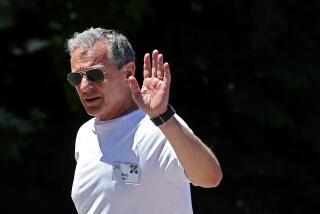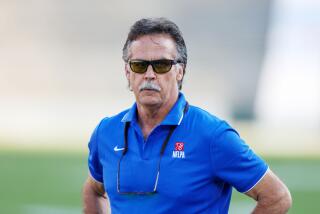No Consensus Yet on a Replacement
One is a respected consensus builder, a former U.S. senator’s son who has spent more than a decade in a vital behind-the-scenes role with the NFL.
Another is a financial impresario whose star is on the rise after helping bring the league back from the brink of potential disaster.
For the record:
12:00 a.m. March 22, 2006 For The Record
Los Angeles Times Wednesday March 22, 2006 Home Edition Main News Part A Page 2 National Desk 1 inches; 33 words Type of Material: Correction
Pro football -- An article in Tuesday’s Sports section on NFL Commissioner Paul Tagliabue’s retirement said one potential candidate to replace him was Secretary of State Condoleeza Rice. Her name is Condoleezza Rice.
A third is a prominent team executive who is part businessman, part football man, a Princeton-educated lawyer who can explain the nuances of a stadium lease and an on-side kick.
Each of the three leading candidates to replace retiring NFL Commissioner Paul Tagliabue -- league executives Roger Goodell and Eric Grubman and Atlanta Falcon President Rich McKay -- has strengths that could qualify him for the most important job in sports. Other candidates who have been mentioned are Steve Bornstein, who heads the NFL Network, and even U.S. Secretary of State Condoleeza Rice, a devout football fan.
The position, which comes open in July and paid Tagliabue in the neighborhood of $10 million a year, is among the most challenging and prominent jobs in the sports and entertainment industries. It requires a working knowledge of the political, financial, broadcasting and new-media worlds. As for football? That’s almost an afterthought.
“The job is like attending 10 weddings at the same time and making every bride and groom feel like they’re the ones,” said Robert Kraft, owner of the New England Patriots. “I’ve seen a lot of things in business, but I don’t think I’ve seen anything that requires the skill set of different expertise that this job does.”
The 32 team owners will select the new commissioner, and the process of doing so is expected to begin at next week’s league meetings in Orlando, Fla. Tagliabue said he would be willing to stay on longer if a replacement hasn’t been chosen by July.
“I’d be very surprised if it isn’t issue No. 1 on Monday morning,” Kraft said, adding the league might hire a headhunting service to sort through all of the possible candidates.
Goodell, the league’s chief operating officer, long has been considered the most obvious successor to Tagliabue. His father was Charles Goodell, who succeeded Robert Kennedy as senator from New York in 1968. The younger Goodell started as an NFL intern in 1982, and later worked in public relations for the New York Jets and the league. Since 1990, he has had several executive roles under Tagliabue, most notably helping oversee expansion and stadium development.
It was Goodell who played a leading role when competing Los Angeles groups were vying for an expansion franchise in the late 1990s, a bid that ultimately went to Texas oilman Robert McNair, who formed the Houston Texans.
Goodell not only poured a lot of sweat into the L.A. effort, but some blood as well. He suffered a cut on his leg that required stitches when, during a presentation in 1998, a hefty model of the Coliseum was accidentally dropped on him.
Whereas Goodell has spent most of his adult life with the NFL, Grubman arrived two years ago at age 46 after 14 years at Goldman Sachs, where he was a partner and managing director for the investment banking firm. He had worked with the NFL on the sale of the Patriots, Cleveland Browns and New York Jets.
Tagliabue persuaded Grubman to join the NFL, appointing him the league’s executive vice president of finance and strategic transactions. It was Grubman who in the last two years stepped up the league’s efforts to find a stadium solution in the L.A. area.
But Grubman’s most significant contribution to the league came earlier this month when owners met in Dallas to sort through the thorny issues of extending the labor agreement with the players’ union, and devising a revenue-sharing plan to better distribute the wealth among teams. He helped craft a plan that led to a 30-2 vote in favor of a new labor agreement and new revenue-sharing plan.
McKay, a son of legendary USC football coach John McKay, is co-chair of the league’s competition committee, which studies all aspects of the game and recommends rule and policy changes. He is widely respected in league circles and, before joining the NFL full-time, was a Tampa attorney who represented the Buccaneers for six years.
More to Read
Go beyond the scoreboard
Get the latest on L.A.'s teams in the daily Sports Report newsletter.
You may occasionally receive promotional content from the Los Angeles Times.











